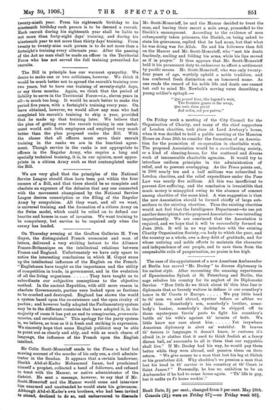Sir Colin Scott-Moncrieff sends to the Times a brief but
moving account of the murder of his only son, a civil adminis- trator in the Soudan. It appears that a certain landowner, Sheikh Abd-el-Kader Mohammed Imam, had proclaimed himself a prophet, collected a band of followers, and refused to treat with the Mamur, or native administrator of the district. He sent a message, however, to say that if Mr. Scott-Moncrieff and the Mamur would come and interview him unarmed and unattended he would state his grievances. Although Abd-el-Kader's own brothers, who had been invited to attend, &alined to do so, and endeavoured 'to dissuade
Mr. Scott-Moncrieff, he and the Mamur decided to trust the man, and leaving their escort a mile away, proceeded to the Sheikh's encampment. According to the evidence of men subsequently taken prisoners, the Sheikh, on being asked, to state his grievances, replied that he had none, but that what he was doing was for Allah. He and his followers then fell on the Mamur and Mr. Scott-Monmieff, who "met his death fearlessly, smiling and folding his arms, while his lips moved as if in prayer." It thus appears that Mr. Soott-Monorieff held it his paramount duty to endeavour to effect a settlement by pacific means. Mr. Scott-Moncrieff, who was only twenty- four years of age, worthily upheld a noble tradition, and has conferred fresh distinction on an honoured name. As one reads the record of his noble life and death one cannot but call to mind Mr. Newbolt's moving verse describing a young soldier's epitaph ;—
" Qui proeul hine, the legend's writ, The frontier grave is far away, Qui ante diem periit Bed miles, sed pro patria."






































 Previous page
Previous page